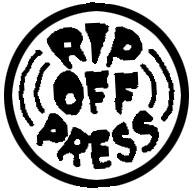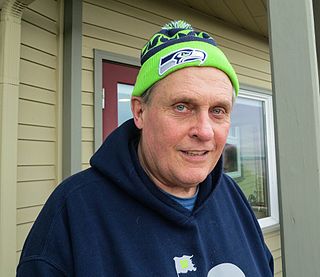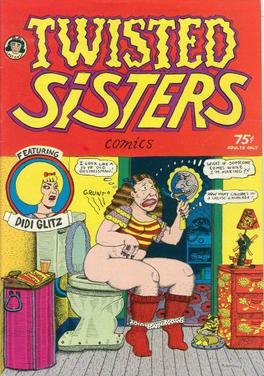Related Research Articles

Daniel Gillespie Clowes is an American cartoonist, graphic novelist, illustrator, and screenwriter. Most of Clowes's work first appeared in Eightball, a solo anthology comic book series. An Eightball issue typically contained several short pieces and a chapter of a longer narrative that was later collected and published as a graphic novel, such as Like a Velvet Glove Cast in Iron (1993), Ghost World (1997), David Boring (2000) and Patience (2016). Clowes's illustrations have appeared in The New Yorker, Newsweek, Vogue, The Village Voice, and elsewhere. With filmmaker Terry Zwigoff, Clowes adapted Ghost World into a 2001 film and another Eightball story into the 2006 film, Art School Confidential. Clowes's comics, graphic novels, and films have received numerous awards, including a Pen Award for Outstanding Work in Graphic Literature, over a dozen Harvey and Eisner Awards, and an Academy Award nomination.
A minicomic is a creator-published comic book, often photocopied and stapled or with a handmade binding. In the United Kingdom and Europe the term small press comic is equivalent with minicomic, reserved for those publications measuring A6 or less.

Weirdo was a magazine-sized comics anthology created by Robert Crumb and published by Last Gasp from 1981 to 1993. Featuring cartoonists both new and old, Weirdo served as a "low art" counterpoint to its contemporary highbrow Raw, co-edited by Art Spiegelman.

Eclipse Comics was an American comic book publisher, one of several independent publishers during the 1980s and early 1990s. In 1978, it published the first graphic novel intended for the newly created comic book specialty store market. It was one of the first to offer royalties and creator ownership of rights.
The Ignatz Awards recognize outstanding achievements in comics and cartooning by small press creators or creator-owned projects published by larger publishers. They have been awarded each year at the Small Press Expo since 1997, only skipping a year in 2001 due to the show's cancellation after the September 11 attacks. As of 2014 SPX has been held in either Bethesda, North Bethesda, or Silver Spring, Maryland.

Alien Encounters is an American science fiction anthology comic book published by FantaCo Enterprises and then Eclipse Comics. The comic debuted with FantaCo in 1981, and in 1985 was taken over by Eclipse.

Wimmen's Comix, later retitled (respelled) as Wimmin's Comix, is an influential all-female underground comics anthology published from 1972 to 1992. Though it covered a wide range of genres and subject matters, Wimmen's Comix focused more than other anthologies of the time on feminist concerns, homosexuality, sex and politics in general, and autobiographical comics. Wimmen's Comix was a launching pad for many cartoonists' careers, and it inspired other small-press and self-published titles like Twisted Sisters, Dyke Shorts, and Dynamite Damsels.

Rip Off Press Inc. is a comic book mail order retailer and distributor, better known as the former publisher of adult-themed series like The Fabulous Furry Freak Brothers and Rip Off Comix, as well as many other seminal publications from the underground comix era. Founded in 1969 in San Francisco by four friends from Austin, Texas — cartoonists Gilbert Shelton and Jack Jackson, and Fred Todd and Dave Moriaty — Rip Off Press is now run in Auburn, California, by Todd.

Lloyd Dangle is an American writer and cartoonist, illustrator, and political satirist.

Dennis P. Eichhorn was an American writer, best known for his adult-oriented autobiographical comic book series Real Stuff. His stories, often involving, sex, drugs, and alcohol, have been compared to those of Jack Kerouac, Ken Kesey, and Charles Bukowski.

Kim Thompson was an American comic book editor, translator, and publisher, best known as vice president and co-publisher of Seattle-based Fantagraphics Books. Along with co-publisher Gary Groth, Thompson used his position to further the cause of alternative comics in the American market. In addition, Thompson made it his business to bring the work of European cartoonists to American readers.

Tits & Clits Comix is an all-female underground comics anthology put together by Joyce Farmer and Lyn Chevli, published from 1972 to 1987. In addition to Farmer and Chevli, contributors to Tits & Clits included Roberta Gregory, Lee Marrs, and Trina Robbins.
Leonard Rifas is an American cartoonist, critic, editor, and publisher associated with underground comix, comics journalism, left-wing politics, and the anti-nuclear movement. He is notable for his contributions to the form of minicomics as well as publishing Japanese manga in the United States. Rifas' publishing company, EduComics, operated most actively from 1976 to 1982.
Krystine Kryttre is an American alternative comics artist, painter, animator, writer, and performer from San Francisco. currently based in Los Angeles. Her work is dark, often explicit, and visually distinctive." Her work has been exhibited in galleries since the late 1980s, including a number of solo shows in Los Angeles.

Starhead Comix was an alternative/underground comics publisher that operated from 1984–c. 1999. Founded by Michael Dowers, Starhead was based in Seattle, Washington. Mostly known for limited-edition minicomics, Starhead also published standard-sized, black-and-white comics in the early 1990s.
J. R. Williams is an American cartoonist, animator, and fine artist best known for his late 1980s/early 1990s work in alternative comics. Known for his manic, exaggerated cartooning style, Williams brought an underground comix edge to his work during this period. Williams' characters Skinboy and the Bad Boys made recurring appearances in many of his stories.

Twisted Sisters is an all-female underground comics anthology put together by Aline Kominsky and Diane Noomin, and published in various iterations. In addition to Kominsky and Noomin, contributors to Twisted Sisters included M. K. Brown, Dame Darcy, Julie Doucet, Debbie Drechsler, Mary Fleener, Phoebe Gloeckner, Krystine Kryttre, Carol Lay, Dori Seda, and Carol Tyler.

Young Lust was an underground comix anthology published sporadically from 1970 to 1993. The title, which parodied 1950s romance comics such as Young Love, was noted for its explicit depictions of sex. Unlike many other sex-fueled underground comix, Young Lust was generally not perceived as misogynistic. Founding editors Bill Griffith and Jay Kinney gradually morphed the title into a satire of societal mores. According to Kinney, Young Lust "became one of the top three best-selling underground comix, along with Zap Comix and The Fabulous Furry Freak Brothers".

Company & Sons was an early underground comix publisher based in San Francisco, ran by John Bagley. The company operated from 1970 to 1973, publishing a total of 15 titles, all but one of them consisting of a single issue.
Angela Bocage is a bisexual comics creator who published mainly in the 1980s and 1990s. Bocage was active in the queer comics community during these decades, publishing in collections like Gay Comix,Strip AIDS USA, and Wimmen's Comix. Bocage also created, edited, and contributed comics to Real Girl, a comics anthology published by Fantagraphics.
References
- 1 2 Beaupre entry, Who's Who of American Comics Books, 1928–1999.
- ↑ Paccia, David. "Steve Lafler - Cartoonist Survey #215," David Wasting Paper (March 22, 2011).
- 1 2 3 Clough, Rob. "Explaining Reality to Myself: The Steve Lafler Interview (Part Two of Three)," The Comics Journal (September 21, 2010).
- ↑ Cwiklik, Gregory. "Objective Opinions: Firing Line: Buzzard #14," The Comics Journal #179 (Aug. 1995), p. 37.
- 1 2 3 Lafler entry, Archived 2015-10-23 at the Wayback Machine Who's Who of American Comic Books, 1928–1999. Accessed Oct. 28, 2015.